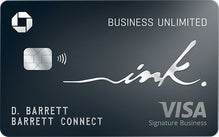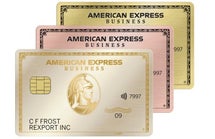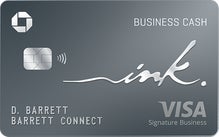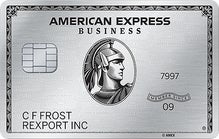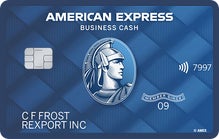Best business credit cards of February 2026
Advertiser Disclosure: Bankrate’s editorial team chooses and recommends the credit cards on this page. Our websites may earn compensation when a customer clicks on a link, when an application is approved, or when an account is opened. However, our recommendations and card ratings are produced independently without influence by advertising partnerships with issuers.
Filter by
Showing 13 results
Best for travel perks
on Capital One's secure site
See Rates & FeesIntro offer
Earn 150,000 bonus miles
Rewards Rate
2X miles - 10X miles
Annual fee
$395
Regular APR
N/A
Why you'll like this: This card includes practical, valuable travel perks at a reasonable cost.
Reward Details
What you should know
Card Details
Best for large welcome offer
on Chase's secure site
See Rates & FeesIntro offer
Earn $750 bonus cash back
Rewards Rate
1.5%
Annual fee
$0
Regular APR
16.74% - 24.74% Variable
Why you'll like this: Its exceptional welcome offer and low cost make it a great starter option if you’re new to building business credit.
Reward Details
What you should know
Card Details
on Chase's secure site
See Rates & FeesIntro offer
Earn 150,000 bonus points
Rewards Rate
1x - 8x
Annual fee
$795
Regular APR
Flex for Business Variable APR: 17.74% - 25.74%
Why you'll like this: It can offer frequent travelers extraordinary value with its many perks and credits.
Reward Details
What you should know
Card Details
Best for category flexibility
on American Express's secure site
See Rates & Fees, Terms ApplyIntro offer
Earn 100,000 points
Rewards Rate
1X - 4X
Annual fee
$375
Regular APR
17.74% - 28.49% Variable
Why you'll like this: It has a high-value welcome offer and great airline transfer partners.
Reward Details
What you should know
Card Details
Best for office expenses
on Chase's secure site
See Rates & FeesIntro offer
Earn $750 bonus cash back
Rewards Rate
1% - 5%
Annual fee
$0
Regular APR
16.74% - 24.74% Variable
Why you'll like this: It has a great welcome offer and earns big on office supplies and internet purchases.
Reward Details
What you should know
Card Details
Limited time offer
$1,000 Welcome Bonus
Intro offer
$1,000 Welcome Bonus
Rewards Rate
Up to 1.5%
Annual fee
$0
Regular APR
N/A
Why you'll like this: You can set it and forget it when it comes to expense management with its automated tools and AI-driven features.
Reward Details
What you should know
Card Details
Best for international business travel
Intro offer
Get 70,000 bonus points and a $99 Companion Fare
Rewards Rate
1 point - 3 points
Annual fee
$70 for the company and $25 per card
Regular APR
19.49% - 27.49% Variable APR on purchases and balance transfers
Why you'll like this: You can earn and redeem rewards worldwide thanks to the robust oneworld® Alliance travel partners.
Reward Details
What you should know
Card Details
Elevated welcome offer
Best for luxury travel perks
on American Express's secure site
See Rates & Fees, Terms ApplyIntro offer
Earn 200,000 Membership Rewards® points
Rewards Rate
1X - 5X
Annual fee
$895
Regular APR
17.74% - 28.49% Variable
Why you'll like this: Its best-in-class perks, generous rewards rate on common business purchases and valuable welcome offer set it apart.
Reward Details
What you should know
Card Details
Best for annual cash bonus
on Capital One's secure site
See Rates & FeesIntro offer
$2,000 cash back
Rewards Rate
2% - 5%
Annual fee
$150
Regular APR
N/A
Why you'll like this: You’ll earn a great rewards rate on every purchase without worrying about tracking spending categories.
Reward Details
What you should know
Card Details
Best no-annual-fee card
on American Express's secure site
See Rates & Fees, Terms ApplyIntro offer
15,000 Membership Rewards® points
Rewards Rate
2X
Annual fee
No annual fee
Regular APR
16.74% - 26.74% Variable
Why you'll like this: It offers great payment flexibility with its intro APR and Expanded Buying Power feature.
Reward Details
What you should know
Card Details
on Capital One's secure site
See Rates & FeesIntro offer
Earn $1,000 cash back
Rewards Rate
2% - 5%
Annual fee
$0 intro for first year; $95 after that
Regular APR
24.49% (Variable)
Why you'll like this: Its flat rewards rate makes earning cash back a breeze, so it’s a great starting point if you’re new to rewards cards.
Reward Details
What you should know
Card Details
Best for flat-rate cash back
on American Express's secure site
See Rates & Fees, Terms ApplyIntro offer
$250 statement credit
Rewards Rate
1% - 2%
Annual fee
No annual fee
APR
16.74% - 26.74% Variable
Why you'll like this: It charges no annual fee and comes with an intro APR offer on purchases — a rarity on business cards.
Reward Details
What you should know
Card Details
Best for building business credit
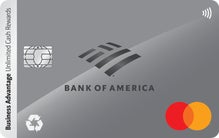
Bank of America® Business Advantage Unlimited Cash Rewards Secured Business Credit Card
Intro offer
N/A
Rewards Rate
1.5%
Annual fee
$0
Regular APR
26.74% Variable APR on purchases and balance transfers
Why you'll like this: You can build your business credit while earning the same rewards as the unsecured version of this card.
Reward Details
What you should know
Remove a card to add another to compare
Remove a card to add another to compare
Compare Bankrate’s top small-business credit cards
| Rewards highlights | ||||
|---|---|---|---|---|
Earn 150,000 bonus miles Hover to learn more $2,550 value Hover to learn more |
| $395 | 4.9 Hover to learn more Best for travel perks | |
Earn $750 bonus cash back Hover to learn more $750 value Hover to learn more |
| $0 | 4.2 Hover to learn more Best for large welcome offer | |
Earn 150,000 bonus points Hover to learn more |
| $795 | 4.9 Hover to learn more Best for credits | |
Earn 100,000 points Hover to learn more $2,000 value Hover to learn more |
| $375 | 5.0 Hover to learn more Best for category flexibility | |
Earn $750 bonus cash back Hover to learn more $750 value Hover to learn more |
| $0 | 4.3 Hover to learn more Best for office expenses | |
Limited time offer More information about this limited time offer Apply now on Ramp's secure site | $1,000 Welcome Bonus Hover to learn more $1,000 value Hover to learn more |
| $0 | 4.3 Hover to learn more Best for expense management |
Apply now on Bank of America's secure site | Get 70,000 bonus points and a $99 Companion Fare Hover to learn more |
| $70 for the company and $25 per card | 4.1 Hover to learn more Best for international business travel |
Elevated welcome offer More information about this important disclosure | Earn 200,000 Membership Rewards® points Hover to learn more $4,000 value Hover to learn more |
| $895 | 4.8 Hover to learn more Best for luxury travel perks |
$2,000 cash back Hover to learn more $2,000 value Hover to learn more |
| $150 | 4.7 Hover to learn more Best for annual cash bonus | |
15,000 Membership Rewards® points Hover to learn more $300 value Hover to learn more |
| No annual fee | 4.1 Hover to learn more Best no-annual-fee card | |
Earn $1,000 cash back Hover to learn more $1,000 value Hover to learn more |
| $0 intro for first year; $95 after that | 4.4 Hover to learn more Best for simplicity | |
$250 statement credit Hover to learn more $250 value Hover to learn more |
| No annual fee | 4.3 Hover to learn more Best for flat-rate cash back | |
Bank of America® Business Advantage Unlimited Cash Rewards Secured Business Credit Card *Hover to learn more | N/A Hover to learn more |
| $0 | 0.0 Hover to learn more Best for building business credit |

